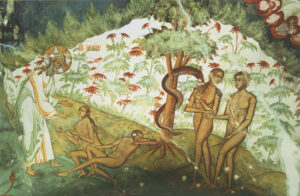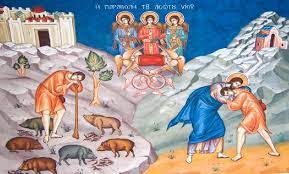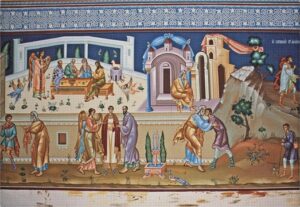
Here’s where we are:
This week there was no Wednesday or Friday Fast. If you forgot: Quick! grab a cheeseburger! preferably the healthy kind like my wife makes.
Next week: normal fasting.
Meatfare Sunday, February 27: last day for meat till Pascha.
Clean Monday, March 7: The Great Fast begins. I once described Orthodox fasting rules to a non-Orthodox friend, who asked incredulously “What do you eat?” I said “roots and berries” – in jest, of course. Really, vegan food can be delicious, and it keeps us right in fashion these days! and also healthier.
Now, to get serious, Saint Paul has important things to say about fasting.
Don’t forget to read the text before we proceed.
Epistle for the Second Sunday of Pre-Lent: I Corinthians 6:12-20
 Paul begins: “All things are lawful for me, but not all things are helpful. All things are lawful for me, but I will not be brought under the power of any. Food was made for the stomach and the stomach for food, but God will destroy them both.”
Paul begins: “All things are lawful for me, but not all things are helpful. All things are lawful for me, but I will not be brought under the power of any. Food was made for the stomach and the stomach for food, but God will destroy them both.”
Icons by permission of Saint Isaac’s Skete at skete.com
What Christians should eat, what perhaps they shouldn’t eat – these were big issues in the early Church. Those of Jewish background or sympathies were tempted to return to the Old Testament Fast: no pork because pork was unclean, and so on. Also there was the meat market issue. Animals were sacrificed in pagan temples, then the meat was sold in the market. Should Christians eat such meat? In both cases Paul had said: Eat it. Christians aren’t bound by Old Testament regulations, so eat the pork. Idols have no real existence, and God made all things good, so eat the meat. “All things are lawful.”
Apparently Paul had told them this previously. Some Christians in Corinth, misinterpreting things as usual, said: Hooray! No restrictions. Pork is legal, so let’s pig out. If drink is good, hey buddy, let’s have another one and another and another. And if sex is lawful, well… …! No, No, No! Paul is saying to them here. That’s not what I meant. “All things are lawful, but not all things are helpful.” Things can be legal but still dangerous. It’s legal to down twenty shots of whiskey in a row, but…
Here are some things to keep in mind as we go into the Great Fast.
1 Eating meat during Lent is neither immoral nor illegal. “All things are lawful.” We Orthodox have never had any of this “eat meat on Friday and you’ve committed a mortal sin” stuff.
2 Western Christians historically have had fasting laws which were minimalist: “Here are a few things you must do”. Orthodox fasting rules are maximalist – high goals to aim for, as best we can, which involve a lot more than just giving up meat. Orthodox fasting rules are guidelines which may be adapted as necessary to our situation. (More on this as we get nearer to Great Lent.)

courtesy of Pravmir
3 Fasting also is “lawful”. It has several purposes: Fasting is a tool to be used to help us gain self-control. Fasting expresses the restrained, penitential tone of the Lenten season, as we wait for Pascha. Fasting together helps unite us as a community. Setting aside some good things, like pleasing our palates, helps us focus on what is better and what is best, on God and people and saving our souls. Leaving our stomachs not quite full helps us to emphasize (not just sympathize) with all the hungry people in the world who “fast” by necessity.
4 All things, if misused, can become dangerous, even demonic so that instead of our using them, they begin to use us, control us, enslave us. The most obvious examples are drink or drugs. But even ordinary food can enslave us, so that instead of eating to live, we live to eat: the sin of Gluttony.
We looked at Gluttony ‘way back in Post 93: https://frbillsorthodoxblog.com/2018/11/23/93-seven-deadly-sins-2-gluttony/.
To summarize: Gluttony can mean eating too much, but often Gluttony consists of being excessively fussy about food. This can easily happen just because we eat so often, three times a day not counting snacks. How very much we care about protecting our gastronomy. “I don’t like that”. “I just can’t eat this.” (I confess: Someone once served me cold tongue of something or other for lunch. I just couldn’t manage it.) “I know you spent a lot of time preparing it, but didn’t you know I was a vegetarian?” “That meat is just a little overcooked [or undercooked or whatever]” “I must have my cappuccino with just the right amount of foam, and chocolate, I simply cannot live without chocolate.” (The last sentence refers to a priest whom I know very well.)

M.Verkerk, J.J.G.Claessens (Wikimedia)
Therefore it may help to do without that cappuccino or chocolate (give that up? – you must be kidding…) or alcohol or whatever food or drink we love for a few weeks, just to prove we can control ourselves, that they don’t control us – or maybe so we can discover they do. Keep yourself free in Christ. Do not become enslaved to anything.
Another form of Gluttony can be making food central to our lives. If you think that sounds absurd, consider how much time and effort and energy we put into having just the “right” food these days, how much we read about it, think about it, talk about it – while so many in the world would be overjoyed just to have anything edible.
Don’t misunderstand. Food and drink are good. Not only because we need them, not only because they can be enjoyed, but they also have an important social purpose: Our Church coffee hours and dinners and our get-togethers with friends and family build community. They draw us together. There is a reason why the central worship service of the Church includes eating and drinking, why the Church’s great Holy Days are called Feasts. “Food is for the stomach and the stomach for food” – a gift of God to be savored. Yes, says Paul, but don’t forget “God will destroy them both.” Food is not what life is all about.
Next Saint Paul applies the “fasting” principle to sexual behavior. If fasting is not a moral issue, sexual behavior is.
 Corinth was a big party town. When people (even people who lived far beyond Corinth) were about to have a fling, drinking and and dancing and, um, “what not”, they’d sometimes say: “Let’s go Corinthing”
Corinth was a big party town. When people (even people who lived far beyond Corinth) were about to have a fling, drinking and and dancing and, um, “what not”, they’d sometimes say: “Let’s go Corinthing”
Thomas Couture, 1847 (Promise not to look too closely.)
Sex also is a good gift of God, but misused it also can easily go bad, can enslave. “Whoever lusts for a woman… has already committed adultery in his heart.” Matthew 5:27-28 With the easy access to pornography on the internet, addiction to porn is a big problem these days. Here is something to try to give up during Lent, and then forever after. And if you cannot, get help!
The Church has always taught that sexual union outside marriage is wrong. Paul says that sexual union creates spiritual union, and therefore “joining yourself to a harlot” was a problem. This was common in Corinth. What do I know at my age? – but judging by what I see on TV and cable and in the movies, it’s apparently acceptable behavior today for “nice” people of both sexes to “join themselves” to quite a number of other people.
“Flee sexual immorality” for “it is a sin against your own body”. Was Saint Paul just being a prude? No, he was being a theologian and an apt observer of human life. And if he was right, that might explain why today so many peoples’ souls, their interior lives, seem to be so torn apart.
“Do you not know that your body is the temple of the Holy Spirit who is in you, whom you have from God. You do not belong to yourself. You were bought with a price. Therefore glorify God in your body and in your spirit which are God’s.”
Is that clear enough, you Corinthians?
Hymn from Pre-Lenten and Lenten Sunday Matins, chanted by Father Apostolos Hill (from Orthodox Chants site)
Gospel for the Second Sunday of Pre-Lent: Luke 15:11-32
“Prodigal” means “prodigiously wasteful”. The story of the son who demanded his inheritance of his father, who valued the money more than his father – about the most insulting thing he could have done – then wasted it on riotous living, and wound up eating with the pigs.
Like many of Jesus’ parables, this can be heard at more than one level. There’s a whole lot going on here.
Let’s start at the top and work down.
Third Level
This parable is the story of mankind’s rebellion and God’s love. Who is the prodigal son who took his inheritance and ran off and wasted it and wound up living in squalor? The prodigal son is Adam.
 “Adam”, I think you know, is a generic name, which means “man, mankind”, all of us. Human beings were created by God our Father to live in a Garden with all good things provided for us, loved by God, loving God, loving each other. We threw it away, and we still do, and now we’re living the way we are. Look at the world, Look at us. Look at you. Look at me. But if and when finally we come to our senses and turn back towards God, our loving Father, He comes running out to welcome us, eager to forgive us.
“Adam”, I think you know, is a generic name, which means “man, mankind”, all of us. Human beings were created by God our Father to live in a Garden with all good things provided for us, loved by God, loving God, loving each other. We threw it away, and we still do, and now we’re living the way we are. Look at the world, Look at us. Look at you. Look at me. But if and when finally we come to our senses and turn back towards God, our loving Father, He comes running out to welcome us, eager to forgive us.
 In Jesus Christ, God our Father has come to earth, ready to forgive us and welcome us home – if we will have it. “God showed His great love for us by sending Christ to die for us while we were still sinners” Romans 5:8 , for “whoever has seen Me has seen the Father.” John 14:9 Instead of our rags of sin, He will clothe us in the garments of Baptism. His great banquet awaits us in Heaven – of which our first taste is the Holy Eucharist. When we go to Confession, we don’t have to worry whether He’ll forgive us. We already know that if we’re repentant, He will.
In Jesus Christ, God our Father has come to earth, ready to forgive us and welcome us home – if we will have it. “God showed His great love for us by sending Christ to die for us while we were still sinners” Romans 5:8 , for “whoever has seen Me has seen the Father.” John 14:9 Instead of our rags of sin, He will clothe us in the garments of Baptism. His great banquet awaits us in Heaven – of which our first taste is the Holy Eucharist. When we go to Confession, we don’t have to worry whether He’ll forgive us. We already know that if we’re repentant, He will.
However, take careful note: Like the father in the parable, Christ did not go into the pigsty to save us. He did not sin. He is ready to forgive, but He cannot forgive us unless we want to be forgiven, unless we repent and come to Him. God’s forgiveness is free, but it’s not cheap.
Second Level
In this parable, Christ was “prophesying” what would be happening a few decades later. From the Church’s perspective, there would then be two chief religious groups:
The Gentiles were the Prodigal Son, who had strayed far from God and righteousness, but now were returning to Him, and the Church was welcoming them.
The Elder Brother was the Jews who had long believed in God, been faithful to Him. How did they feel about all these Gentiles turning to their God and being accepted by the Church? They resented it. Why should God throw a party for these unworthy untouchable people? And so the Jews have missed the Banquet.
First Level
This is the literal interpretion, which applies to us individually. Even that has three aspects: We can play the roles of the prodigal son or the merciful father or, God forbid! of the elder brother.

The Prodigal Son. Like him, you and I have been recklessly wasteful with our inheritance, the good things God has given us. Ask yourself: “How much time and energy have I wasted eating pig food, spending my time on junk or worse or on nothing much, when I could have been with God, surrounded by His love, doing worthwhile fulfilling things, actually being happy.” It’s time to wake up, repent, turn around and go home, confess my sin and stupidity. In case you think you haven’t sinned much, all I can say is: You must have mighty low standards. Read Christ’s moral teaching in the Gospels. Hold yourself up against the saints. Then be the prodigal son. Repent. Go to Confession! Also, Forgiveness Sunday is in two weeks, the day to apologize and forgive before we enter into Lent. We’ll talk about that as it draws nearer.
The Father. The father was making a public spectacle of himself. In those days a father who had been offended would sit and wait and then, if the wayward son was abject enough, he might forgive. But here the father runs out to his son, so that before the his boy can say a word, he already knows he will be forgiven. Like the father, when people have hurt you, make it easy for them to say they’re sorry. Why do people often not apologize? Not because they’re not sorry, but because they fear if they say it, they’re going to be turned away. Be eager to forgive.

The Elder Brother. Please, please do not play the role of the resentful elder brother. “Well! I have served you faithfully all these years, and here this son of yours has squandered everything, and you throw a party for him! You never threw a party for me. It’s not fair!” The elder brother was right, of course. His younger brother had been a stupid irresponsible fool, and his father was not being fair.
What does that have to do with anything? The Kingdom of God is not about fairness and justice. It’s about mercy and love and joy. If God is just with us, what hope is there for any of us? Jesus said “There will be more rejoicing in heaven over one sinner who repents than over ninety-nine righteous persons who do not need to repent.” Luke 15:6
Here’s the catch in that line: You find me one person who needs no repenting. It certainly wasn’t the elder brother. What did he need to repent of? Lack of love: If he had truly loved his brother he too would have been glad he came home. He was also guilty of stupidity: “I’d rather be right than be happy.” He was willfully missing the love and joy which were the true inheritance of his father’s house.
So at the end of the parable: Now who was being recklessly wasteful? Now who was throwing it all away? Now who needed to repent? Now who was the prodigal son?
Likewise, if you have been faithful, or at least see yourself that way: When people have rejected you or have hurt you or those you love… what should your attitude be? You must be ready to forgive. However, do not try to make yourself holier than Jesus. Our forgiveness also should be free but not cheap. We’ll say more about that when we come to Forgiveness Sunday.
Did the elder brother ever repent? We don’t know. The story ends here.
But your story hasn’t ended. Before it does: Repent. Forgive. Love. That is the true spirit of Lent and of the Kingdom of God.
chanted by Father Apostolos Hill
“When I disobeyed in ignorance Thy Fatherly glory, I wasted in iniquities the riches that Thou gavest me. Wherefore I cry to Thee with the voice of the prodigal son, saying, “I have sinned before thee. O compassionate Father, receive me repentant and make me as one of Thy hired servants.”
Next Week: Meatfare Sunday: The Last Judgment.
Week after Next: Cheesefare Sunday: Forgiveness Sunday